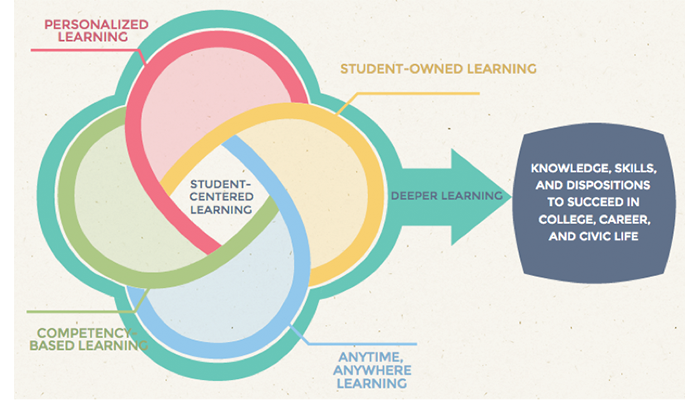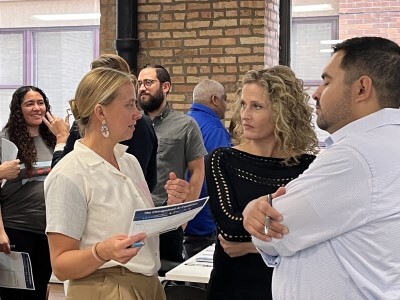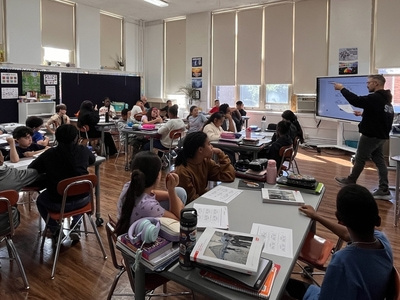Professional Learning
K-12 Roundup of Tools and Resources: Supporting Personalized Learning with the Students at the Center Hub
Topics

Educators are the lead learners in schools. If they are to enable powerful, authentic, deep learning among their students, they need to live that kind of learning and professional culture themselves. When everyone is part of that experiential through-line, that’s when next generation learning thrives.
Practitioner's Guide to Next Gen Learning
In this week’s Roundup, I highlight the Students at the Center Hub and share a sampling of the tools, resources, and information that can be accessed there.
In the last Roundup of Tools and Resources, I shared my perspective as a former teacher: Every day, teachers do the hard work of facilitating and supporting student learning. I had the opportunity to connect with practitioners recently at New England Secondary School Consortium’s annual conference, High School Redesign in Action. My time at the conference reinforced my perspective AND gave me a window into a new resource that has the potential to support teachers, administrators, parents, and students as we implement personalized learning.
In this week’s Roundup, I highlight the Students at the Center Hub and share a sampling of the tools, resources, and information that can be accessed there.
The Nellie Mae Education Foundation, which has supported student-centered approaches to learning in New England for about a decade, partnered with Jobs for the Future to create the Hub. The Students at the Center Hub is built around a definition of student-centered learning comprised of four research-backed key principles: Personalized Learning; Anytime, Anywhere Learning; Competency-Based Learning; and Student-Owned Learning.
When implemented with an eye toward deeper learning outcomes, together these four principles have an amplifying effect that results in a framework for better college, career, and civic outcomes for youth.
The four principles of the student-centered definition align with the key attributes of personalized learning synthesized on the NGLC website. The Hub’s mission is tri-fold:
- To raise awareness of student-centered learning
- To serve as a centralized place to access tools, resources, and information on approaches to student-centered learning
- To provide a space for practitioners to interact with each other and with supporters of student-centered learning
(The “About” page provides more information on what this hub offers families, educators, and students.)
Be sure to check out the following:
Social Media Portal - Visit this portal and you will gain access to an aggregate of conversations happening across several social media platforms, including Twitter, Instagram, and Facebook. You can connect with other educators focused on personalized student-centered learning, and also can join the conversation via Twitter by following the newly launched @StudentCntrHub.
Resources - High quality resources curated by the Students at the Center team using a set of vetting tools. You can view all the resources or sort by category, like I did here: check out these resources on personalized learning. Customize your search by filtering for audience (educators, students, families), category (advocacy, policy, practice, research), tenet (anytime, anywhere, competency education, personalized learning, student-owned), resource type, and/or by tags.
Tools - Professional Development Modules designed by classroom teachers in partnership with a researcher and Jobs for the Future staff. The developers engaged in a learner-centered development process (I experienced a condensed version of this at one of the conference sessions!) to create four PD modules:
- Self-Regulation - Participants will learn to identify and support students who struggle with self-regulation and leave the module with a teacher-generated document to bring back to the classroom to use with their students in support of self-regulation.
- Motivation - Participants will explore how teacher behaviors can affect student motivation. The malleability of student motivation is explored, and participants will explore best practices for motivating students.
- Engagement - Participants will explore definitions and personal experiences with student engagement. Research-supported strategies to increase engagement will be reviewed and applied. Participants will learn how to identify and evaluate engagement and make adjustments to lesson plans and classroom practices to increase student engagement.
- Student Voice - coming soon!
Research Series - Students at the Center has commissioned and produced research series on student-centered approaches, competency education, and deeper learning (they are in the middle of working on this last one). The Competency Education Research Series presents research syntheses and updates from the field that help build the foundational data, theory, and information needed to support effective implementation and policy for competency education. Read this blog post and access this report for more information.
The Hub is in beta version and your feedback is welcome. Sincere thanks to Program Director Rebecca Wolfe (@rewolfeJFF) and Senior Program Manager Clare Bertrand (@cbertrand88) at Jobs for the Future for their contributions to this week’s edition.




